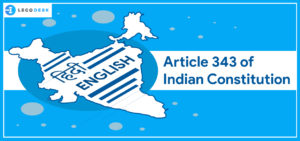Article 343 of Indian Constitution

Article 343 is enshrined in Part 17 of the Constitution of India. Both Article 343 and Article 344 are covered under Chapter 1 of the Indian Constitution. Chapter 1 enunciate the official language of the Union. In this article, we will talk about the statutory provision entailed in Article 343 of the Indian Constitution. We will also talk about the evolution of the Hindi language as the official language of the Union.
Article 343 – Official Language of the Union
According to Article 343, the Devanagari script of Hindi language will be the official language of the Union. It also provided that the English language along with Hindi will be continued to use for 15 more years, i.e., up to 25 January 1965 years from the date of commencement of the Constitution. Part 3 of Article 343 vests power in the Parliament to make a law to continue the use of the English language for official purposes even after 25 January 1965. The Constitution makes it clear that the President by the order can authorize the use of Hindi language besides English and the Devanagari form of numerals besides the international form of Indian numerals for any of the official purposes of the Union.
Under the circumstances, the Parliament enacted The Official Languages Act, 1963. Section 3 of The Official Languages Act, 1963 came to force on the 26th day of January 1965 and provided for the continuance of English language official purposes of the Union and for business transaction in Parliament. This Act also laid down that both English and Hindi languages will be used for specific purposes like to give Orders, pass Resolutions, Notifications, Rules, Agreement, Licenses, Contracts, Notices, Forms of Tenders, etc.
Pre – Independence Language Scenario
Before India’s independence, India was a British colony. Long before the British rule, the Moghuls had an overwhelmingly dominant position over India. The Moghuls were Muslim invaders and spoke the Persian language. The Moghuls, after the river Indus which flows in Pakistan now, called India as ‘Hind’ or ‘Hindustan.’ The language of the Hindustan was known as Hindi or Hindustani language. The Hindi language originated from the widely used ancient Indian language ‘Sanskrit. Later even the Moghul family member started using Hindi language, taking words from Arabic and Persian languages to make Hindi poetry. Slowly the Persian language of the Moghuls was replaced by another language known as Urdu. Urdu then became the official language and was used widely even after the Moghuls collapsed.
The collapse of the Moghuls gave rise to the British rulers. The British introduced the English language to India. The English language made its entry to India after the East India Company came into force in the 1600s. During the British rule, the Hindu nationalists demanded a change in the official language of India from Urdu to Hindi. The debate between Muslims and Hindus continued until the division of British India into India and Pakistan. It was then that Hindus made Hindi with Devanagari script as their official language. But the debate over Hindi as the official language from India did not end.
Post – Independence Language Scenario
Soon after India got independence from the British rule in 1947, Hindi language was decided to be the official language of India. But, the speakers of other languages in India, especially the Dravidian language revolted. The Hindi language is considered to be the language of the Aryans. The Dravidian languages were spoken by the people who belonged to the southern states of India. The Dravidian’s felt that the government was trying to impose Hindi on them, trying to erase their language cultures. After various struggles, the central government decided to allow the state governments to pick their official languages and recognized constitutionally other languages of India. Indian Constitution recognizes 18 different languages now.
In the case of Vijay Singh Chauhan v. Bharat Singh, 2015, the petitioner through a Public Interest Litigation filed a petition before the courts to issue appropriate order or writ or to issue an appropriate direction to the Union of India and the State of Madhya Pradesh to do all work in Hindi. His main contention was to make the Hindi language compulsory for all official work in all Public Sector Undertaking.
This petition was disposed of by the court. This was in reference to Article 343 of the Constitution of India and the Official Languages Act, 1963, which were followed by the respondents. Official Languages Rules, 1976 were also highlighted by the respondent. All government departments were adherent to the statutory provisions as contained in the Official Languages Rules, 1976.
Read Also: Promotion of Hindi Language – Article 351
Conclusion
Indian constitution through Article 343 declares both Hindi and English languages to be the official languages of India. The Official Languages Act, 1963 clearly mentions continuing the use of English language for any official purposes of the Union or other business-related matters. The other states and territories are free to choose their own official languages bypassing proper legislation. The Hindi language had its roots with India prior to independence. This was the main reason to make Hindi as the official language of India and not just because it was a commonly spoken language.
Try our Debt Resolution solutions today Request a Demo